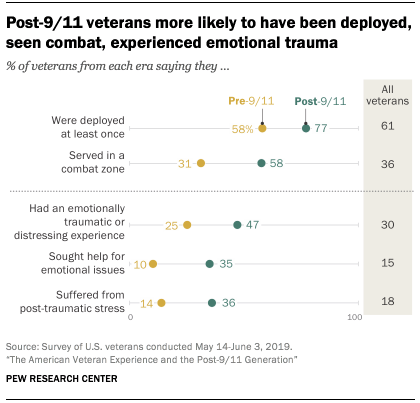High Rates of Deployment, Combat Affected Them Mentally, Physically
WASHINGTON—This likely will come as little surprise to the VA and DoD medical personnel who care for them, but recent veterans really are very different from those who came before them.
A recent report from the Pew Research Center noted that about 20% of veterans served on active duty after the terrorist attacks of Sept. 11, 2001. A survey conducted by the group indicated that having been more likely to be deployed and see combat gave the younger veterans a unique set of experiences compared with those who served in previous wars.
Perhaps most significant, according to the report, is that post-9/11 veterans are more likely to be scared—both physically and psychologically—by their experience. In fact, nearly half, 47%, of post-9/11 veterans describe emotionally traumatic or distressing experiences related to their military service, compared with one-quarter of pre-9/11 veterans. In addition, about one-third (35%), said they sought professional help to make sense of their experiences, with about the same percentage suspecting they suffered from post-traumatic stress.
The experience wasn’t all bad, however, the respondents said.
“Among veterans who were deployed at least once, post-9/11 veterans are much more likely than pre-9/11 veterans to report certain positive and negative consequences from deployment,” the Pew authors wrote. “Two-thirds of post-9/11 veterans say being deployed had a positive impact on their financial situation (compared with 30% of pre-9/11 veterans). At the same time, 42% of post-9/11 veterans—but only 17% of pre-9/11 veterans—say being deployed had a negative impact on their mental health.”

This survey, conducted in May and June of 2019, included both a general population sample of U.S. adults and a sample of U.S. military veterans. In order to achieve a reliable sample size of veterans, two online probability-based panels were used: KnowledgePanel and Pew Research Center’s American Trends Panel.
For purposes of the study, veterans were defined as men and women who do not currently serve on active duty in the U.S. military but did so in the past. Included were those who reported previous full-time service in the Army, Navy, Air Force, Marines or Coast Guard, as well as those mobilized for full-time service or deployed while serving in the reserves or National Guard.
Continue Reading this Article: Ratings for VA Care

Forgive this as my failure, but I believed the article would be addressing the differences in perceptions between veterans from different war deployments, such as WWII vs. Korea vs. Vietnam vs Gulf War…